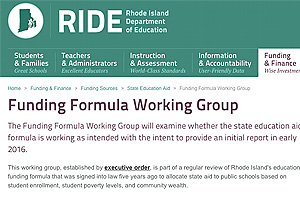 Created by Gov. Gina Raimondo in late October, the 29-member Funding Formula Working Group developed a draft package of adjustments to the state formula to be delivered to policymakers as soon as this week.
Created by Gov. Gina Raimondo in late October, the 29-member Funding Formula Working Group developed a draft package of adjustments to the state formula to be delivered to policymakers as soon as this week.
At their meeting tonight, the working group is expected to approve 20 recommendations responding to Gov. Raimondo’s executive order. The group has returned suggestions for improvement in three key areas: meeting the needs of all students and schools; ensuring fairness among school types (i.e., traditional districts and charters); and best practices in educational funding, efficiency, and innovation.
None of the recommendations come with specific dollar figures or proposed legislative language. The group’s aim was policy recommendations, rather than budget or mechanisms, and it will be up to the Governor’s staff working with the general assembly to determine specific tweaks to the language of the six-year-old funding statute.
At a basic level, the working group recommended against any major changes to the mathematics of the formula itself, seeking to avoid creating any new “winners or losers” while municipalities are still absorbing the effects. But they did establish as a fundamental principle that allocation should be based on student needs, “irrespective of the type of public school they attend,” and they aimed to do this while producing minimal impact on total state aid spending.
In the first main area, “Meeting the needs of all students,” the group came closest to changing the formula with a recommendation to provide additional support targeted to English Language Learners. Given that the current formula uses the number of students receiving free or reduced price lunch as a proxy (the so-called “student success factor”), this change would bring RI in line with the 46 other states that provide designated ELL funding. The group suggested ensuring that the aid is earmarked for ELL programs and that student progress is monitored (to ensure students are exiting programs appropriately.)
Another significant (and sometimes unpredictable) expense for local districts is high-cost special education students, and the working group recommended providing additional targeted support here as well. Currently, districts can get state aid for students who require 500% of the standard per-pupil expenditure (roughly $60,000). The working group recommended that this should be “adjusted to broaden district and school reimbursement eligibility.”
The second major area, “Ensuring fairness among school types,” introduces some new data-driven thinking about the differing expense profiles and fixed and variable costs incurred by traditional school districts and charter schools. This was not something overlooked in the original formula, but rather a perspective developed in the years since implementation. Traditional school districts face “out of district” special ed costs and other funding burdens that amount to around $1,200 per pupil; charter schools, on the other hand, have average rental costs and debt service of around $900 per pupil. The working group recommended adjustments to the funding formula to take these differing expenses into account, while maintaining balance: “they cannot consider expenses only on the side of charter schools or traditional districts.”
Also integral to fairness, the working group noted, is responding to the constraints of fixed and marginal costs created by school choice. These costs need to be quantified, the group proposed, and additional support should be provided to “traditional districts with high percentages of students enrolled in public schools of choice.”
In the final area, “Best practices in educational funding, efficiency, and innovation,” the working group noted that some communities have maintained “low levels of investment in public education,” and recommended strengthening the “maintenance of effort” language that ensures municipalities account for inflation and enrollment increases. The group also recommended that the funding formula should be subject to review on scheduled basis, and that possibilities for using funding to drive innovation and best practices should be explored.
All in all, the working group’s report provides only a schematic of the areas in which there was broad consensus that adjustment was needed. The actual language of any proposed changes to the funding process will have to wait for articulation by the Governor’s office and the general assembly. The full text of the draft will be available shortly on the RIDE web site.
